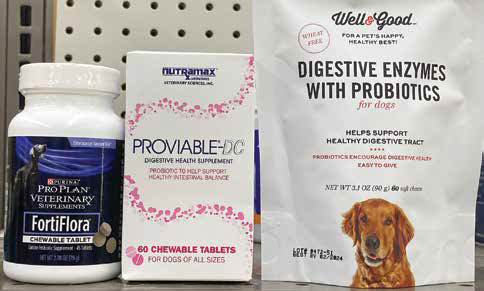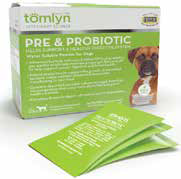
Probiotics (“friendly” or beneficial microorganisms) are everywhere these days – in all kinds of foods and supplements designed for humans and dogs. People used to wonder, “What do probiotics do?” Today, we might wonder what they don’t do, for manufacturers claim that their products improve digestion and reduce symptoms of diarrhea, allergies, dental problems, kidney disease, urinary tract infections, anxiety, depression, arthritis, impaired immunity, inflammation, skin and coat conditions, bad breath, obesity – and even problematic anxious behavior!
For that last claim, at least, there is some decent evidence (see “Behavioral Probiotics,” WDJ August 2020). But very few clinical trials support the full range of advertising claims for canine probiotics. In March 2017, the Journal of the American Veterinary Medical Association published a meta-analysis that reviewed 17 probiotic studies involving dogs and cats. The most encouraging studies found only weak support for the treatment of diagnosed conditions, and all recommended further research.
In contrast, many veterinarians and owners who prescribe or give probiotics to their dogs cite positive anecdotal evidence that beneficial bacteria have helped their dogs. Their enthusiastic recommendations are not disproven but are not well supported by science-based evidence, either.
WHAT ARE PROBIOTICS & WHAT DO PROBIOTICS DO FOR DOGS?
“Probiotic” is a catchall label for any living bacteria or microorganism present in your body that is beneficial to or supportive of your health. If present in sufficient numbers, these bacteria starve or crowd out harmful microbes by depriving them of nutrients and space in the microbiome, a community of bacteria, viruses, fungi, and other microbes in the body, especially the digestive tract. Probiotics may also secrete chemicals that can kill pathogenic bacteria and even viruses.
The risks of experimenting with probiotics appear to be low. Adverse side effects are rare. Probiotic supplements do not promote antibiotic resistance in other bacteria and are not themselves pathogenic. Severely immunocompromised dogs should be given probiotics only under veterinary supervision, but for most dogs, probiotics are considered safe.
TYPES OF PROBIOTICS FOR DOGS
Though there are countless species of microorganisms that could be considered as probiotics, there are only a dozen or so that are frequently found in supplements manufactured for use in humans and dogs. Here are a few of the most common dog probiotics:
- Lactobacillus bacterial species ferment sugar into lactic acid, preventing harmful bacteria from growing in the intestine. These bacteria are used in the production of fermented foods such as yogurt, kefir, sauerkraut, and pickles. Lactobacillus acidophilus, L. casei, and L. rhamnosus often appear in probiotic supplements intended for dogs. Note that L. casei has been thought to increase anxiety in dogs, but that association has not been demonstrated in clinical trials.
- Soil-based organisms (SBOs) occur naturally in soil and water, though today’s population of SBOs is a fraction of what it was before the adoption of herbicides, pesticides, and factory-farming methods. Most SBOs survive stomach acid, heat, and exposure to antibiotics; they do not require refrigeration and are not made from dairy products. Bacillus coagulans, B. indicus, and B. subtilis are SBOs considered safe for dogs.
- Saccharomyces boulardii is not a bacterium but rather a beneficial yeast. It treats acute and chronic diarrhea and yeast infections in humans, and it is said to have a similar effect on dogs. When used concurrently with antibiotics, S. boulardi helps protect beneficial gut bacteria from the damage caused by the antibiotics.
CHOOSING A PROBIOTIC FOR YOUR DOG
Probiotic supplements come as pills, capsules, powders, soft treats, enhanced foods, and live-culture yogurt and kefir. Most dogs accept probiotics willingly, especially if they are combined with favorite foods.
The probiotic marketplace is confusing because there are so many species of beneficial microorganisms, only a few of which have been studied. Conclusions based on human or laboratory animal research may not apply to dogs.
We recommend shopping for probiotics from well-known manufacturers whose products are clearly labeled with species and strain, such as Bifidobacterium animalis (strain AHC7) or Enterococcus faecium (strain SF68), which are recommended for dogs with acute diarrhea.
Check labels for the product’s strength measured in colony-forming units (CFUs), which estimate the number of viable microorganism cells capable of reproducing in a sample. Most veterinary sources recommend 1 to 10 billion CFUs daily for dogs. Products that measure their CFUs in the millions or lower numbers are likely to be ineffective.

Prebiotics are indigestible food ingredients that nourish or feed beneficial bacteria, improving the host animal’s health. Most prebiotics consists of soluble, fermentable fibers such as fructooligosaccharides (FOS) and bacteria-supporting fibers from inulin, larch trees, pectins, beet pulp, and gums such as guar gum.
Because they are natural partners, prebiotics are often combined with probiotics in supplements. The small amounts of prebiotic fiber in such products are unlikely to cause problems, but when given by themselves, fiber supplements should be used with caution. Too much soluble fiber can lead to gas and loose stools. It’s important that dogs drink enough water when taking fiber supplements, so add water to your dog’s food if needed.
FOOD SOURCES OF PROBIOTICS FOR DOGS
If your dog enjoys dairy (see “Dogs and Dairy Products,” May 2022), an easy way to provide abundant populations of probiotics while saving money is to make your own yogurt or kefir. Both foods can be made with commercial “starter” powders or a tablespoon of active-culture yogurt or kefir. Yogurt usually contains only a few bacterial strains while kefir may contain over 60. Search online for video demonstrations of the culturing processes or check with starter manufacturers for details.
When introducing freshly made yogurt or kefir, start with small amounts, such as 1 teaspoon per 20 pounds of body weight added to your dog’s dinner. Wait 24 hours and watch for digestive problems such as diarrhea.
If your dog enjoys the taste and feels well, add more the next day. Several experts say to feed up to 2 tablespoons yogurt or kefir per 20 pounds of body weight per day, but many dogs in excellent health eat significantly more. Monitor your dog’s response and check with your veterinarian for best results.
DOSING PROBIOTICS FOR YOUR DOG
Check labels for expiration dates and storage instructions (some probiotics require refrigeration), and follow instructions for use.
If your dog suffers from a condition for which a specific strain of beneficial bacteria is recommended, follow label directions or administer the product as your veterinarian suggests. While your veterinarian may recommend a single-strain probiotic for the treatment of a specific condition, many experts recommend alternating between different strains or cycling through products that contain varying multiple strains.
The side effects of probiotics for dogs are usually temporary because the intestinal microbiome reverts to its pre-supplementation condition shortly after probiotics are discontinued. Because probiotics can be expensive and may be ineffective or incorrectly labeled, watch for improvements within a few weeks as a way of determining whether the supplement is making a difference.





